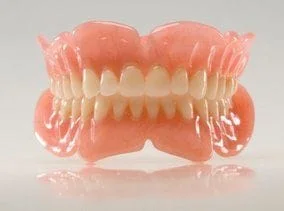
Full Dentures
Dentures are removable replacements for missing teeth. Depending on the remaining teeth, they will be either full or partial dentures. Full dentures are made when none of the natural teeth are available for support. There are two types of full dentures.
- Conventional Full Denture - When all teeth are missing and the tissue is healed conventional dentures can be constructed. This process involves taking impressions and setting teeth in a trial base. The patient sees what the new teeth will look like and has a chance to evaluate the appearance and the feel. The process will usually take 4-6 visits.
- Immediate Full Dentures -When existing teeth need to be removed due to disease and the patient wants to replace them with dentures, dentists use a process called immediate denture fabrication. Prior to having teeth removed, the dentist takes impressions of the existing teeth and bite. From these models a denture is constructed which approximates the desired look and bite. The base will only roughly fit your mouth without teeth. After removing the teeth, the dentures are adjusted and placed in your mouth. The benefit is that you do not have to spend any time without teeth. You will, however, need to have the dentures refitted in 4-6 months because the bone will shrink as your mouth heels. As the bone shrinks the dentures will settle and feel loose. Refitting involves adding material to the denture where it rests on your tissues.
Partial Dentures
Partial dentures are an option when some of your teeth remain. This is similar to a denture, but has a metal framework which hooks around existing teeth and supports the replacement teeth.
General Denture Information
Dentures will take some time to get used to. They will never be as strong as your natural teeth, but with practice whey can function comfortably. The flesh colored base of the dentures rests on your gums. Initially, there will be a period of adjustment. The hard plastic may press on gum tissue and cause a sore spot. Unlike shoes, dentures will not "give", so a visit to the dentist can pinpoint the spot to be relieved on the denture. Some people say dentures feel bulky or that they don't have enough room for their tongue. Dentures will also stimulate your salivary glands to produce more saliva. These feelings will affect the way you eat and talk for a little while. Over time, your muscles become trained to eat and speak with your dentures and they begin to feel more and more like your natural teeth.
Dentures (and your mouth) still require daily home care. Dentures should be brushed to remove plaque and food particles on both the outside and also the inside (the part that rests on your tissue). Your gums should also be brushed with a soft brush. Dentures should be soaked overnight in room temperature water or a denture cleaning solution. Dentures may break if dropped so treat them with care. Sometimes holding them over a soft surface is an added protection.